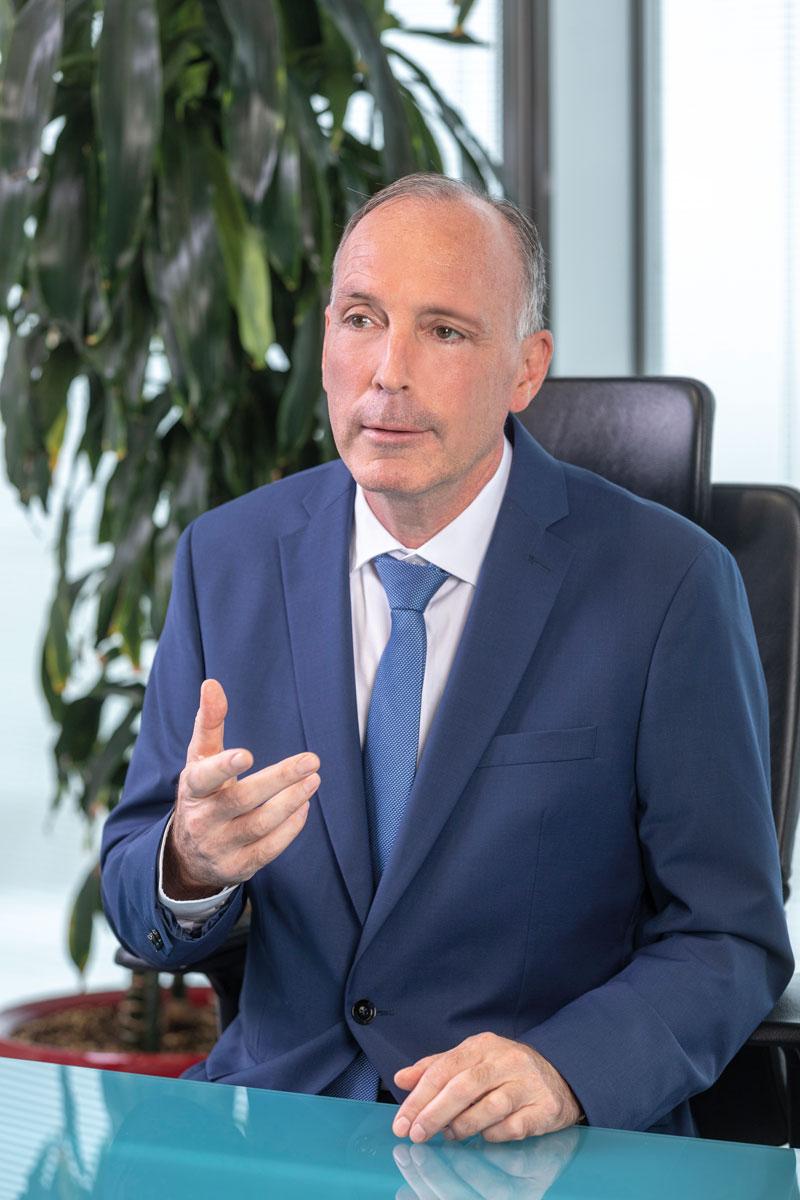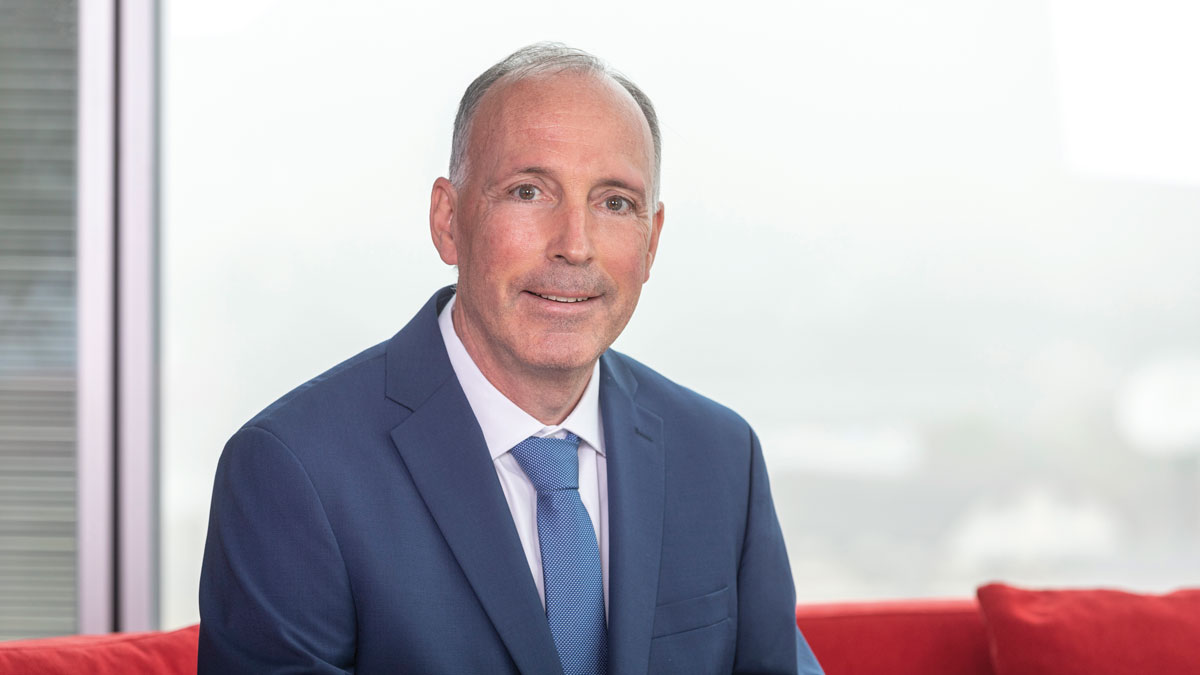Christopher Veit: OMV Petrom Targeting Regional Growth in the Black Sea Area
Christopher Veit was recently appointed as a Member of the Executive Board responsible for Upstream of OMV Petrom. His extensive experience in the oil and gas industry allows him to give valuable insights on local and regional development of this sector and competence requirements for professional excellence in this field.
Christopher Veit holds a degree in Mechanical Engineering and a Masters degree of Petroleum Engineering of the Mining University at Leoben. He joined OMV Group in 1986 as a Production Engineer. He held various technical and management positions in Libya, Pakistan, and Austria such as the Senior Vice President and Managing Director of OMV Austria Exploration & Production GmbH. As of January 2016, he took over the position as Senior Vice-president of Exploration, Development & Production within OMV Exploration & Production GmbH. He also represented OMV in several supervisory boards of its subsidiaries. He is member of the advisory board of the Department Petroleum Engineering at Mining University Leoben. He was appointed member of the OMV Petrom Executive Board starting October 1, 2020.
Dear Mr. Veit, you have given many years of your life to oil and gas industry and you have probably witnessed many achievements and failures over the past years. What is your view on the upstream sector in Romania and on regional level?
Christopher Veit: After the 2015 oil price crash, 2019 was, at the global level, the most successful year for the upstream sector in terms of new well drilled and there were many optimistic signs that 2020 could follow a positive trend. On the other hand, the industry faced increasing pressure to reduce the environmental footprint, while also keeping up with growing energy demand.
However, 2020 has been an extremely difficult year for the industry, which fully felt the disruptive effects of the pandemic. Exploration spending declined and global conventional and unconventional well activity was reduced to all-time lows amid a volatile environment, characterized by record low prices, low demand and overproduction, especially in the early stages of the pandemic, when the authorities imposed state of emergency measures and restrictions on mobility.
These effects were also felt on the internal market and the upstream sector was put to a hard task, not only in terms of dealing with a depressed demand, but also on taking strict sanitary measures to protect the front-line employees while ensuring continuity of operations.
The pandemic has accelerated some trends and shown that for both the upstream and downstream sectors, natural gas has an increasingly important role to play, especially in the near future. In our portfolio, gas accounts for more than 50% of our total hydrocarbon production.
I believe that the future of the Romanian upstream sector is closely linked to the Black Sea natural gas projects. After the Neptun Deep discovery in 2012 and after the newly announced discovery in Turkey, we might get a glimpse regarding the potential of the Black Sea, in deep offshore.
For Romania, which has a mature upstream production, the Black Sea resources are essential, due to their potential for contributing to the national economy and to the energy security of the country. In addition, we expect new licensing bidding rounds for underexplored onshore fields, in order to identify new potential resources that could be exploited and that could counterbalance the natural decline of the current production.
However, in order to unlock the potential of these resources, we need a stable and competitive regulatory and fiscal framework. Fiscal stability is one of the main pillars for projects with a long investment cycle, especially if we take into account the volatile elements that have marked the oil and natural gas market recently.
The importance of the upstream segment of oil and gas industry for the national economy is overwhelming, as it is the largest contributor to the state budget and a significant employer. What is the share of investments in the upstream sector within OMV Petrom? What about its contribution to the company budget?
Christopher Veit: Romania has an outstanding legacy in the onshore and shallow offshore oil and gas production and, as you say, the upstream sector has an essential contribution to the resilience of the Romanian economy, not only through taxation, but also through the fact that it capitalizes on an essential resource for our daily life. In particular, OMV Petrom is one of the largest contributors to the Romanian budget. For example, this year, at the end of the third quarter, our net contribution to the state budget was RON 7.2 bn, including dividends worth RON 360 mn. These figures reflect the importance that OMV Petrom has for Romania’s budget revenues.
But if we are referring only to the upstream sector, it must be said that it is not only a revenue generator for the state budget, through royalties and the supplementary taxation, but it is also an important catalyst for investments. In 2019, we invested 4.2 billion lei, most of this amount, respectively almost 80%, went into upstream projects. Investments have a supply chain effect, adding value to Romania’s economy and the upstream sector accounted for almost two thirds in our operational performance.
However, the year 2020, as mentioned above, brought unforeseen challenges for the oil and gas production. Remember that the world almost stood still for two months during the first wave of the pandemic and, in April, oil prices reached even negative levels. State of emergency measures were the only means to slow down the spread of the virus. However, mobility restrictions have sent shockwaves through the economy and especially into this industry. Things now seem to be rebalancing, after the OPEC + group reached a new agreement to reduce production and amid announcements about the discovery of effective vaccines against the virus.
However, the oil and gas industry, as a whole, still has the potential to be an important engine of the Romanian economy. To take full advantage of this potential, we need to address the following: for the Romanian oil & gas industry, the biggest challenge is the regulatory framework, which does not encourage the production of new hydrocarbon resources to stop the decline of the current domestic production.
With regard to level of royalties, specific effective taxation rate for gas production in Romania is the highest in Europe, while for oil & gas we are significantly above European average. In the last years, new upstream taxes were introduced which is equivalent to having the royalties almost doubled.
A stable and competitive regulatory and fiscal framework would unlock investments, thus generating added value in the Romanian economy and new revenues to the state budget.
OMV Petrom has exploration, development and production operations in the shallow waters and exploration operations in deep water areas. We know that investments in the exploration campaign of the Black Sea resources have reached impressive figures, not to mention the amounts necessary for exploitation. It is the same situation with development of mature fields. Now more than ever, with the current oil price environment, there is urgent need to operate oil and gas reserves in a very efficient way to ensure they stay economical. How do you manage to do this?
Christopher Veit: In the last 8-10 years, the Upstream organization within OMV Petrom went through several adjustments that led to a more flexible organization that together with the skilful and dedicated professionals managed to successfully cope with the industry’s challenges and to improve its resilience to the volatile market conditions. Using new technologies, we focus continuously on the most profitable barrels, while maintaining the discipline of capital expenditures and looking after the opportunities that generate long-term value.
What can you tell us about the evolution of ongoing activities in the Black Sea?
Christopher Veit: OMV Petrom has been active in the shallow water of the Black Sea for over four decades as operator and has gained valuable deep water experience as non-operator in the adjacent Neptun Deep license in Romania. We need to take into account that approximately 10% of Romania’s gas consumption comes from the shallow Black Sea.
Neptun Deep is a strategic project, both for us and for Romania and we continue all our efforts to see this project developed.
At the same time, our strategy includes growth in the Black Sea and a stronger position in the regional energy market. We target regional growth in the Black Sea area, where our technical competencies and experience represent a competitive advantage and where we can benefit from synergies with our existing operations.
We are very proud to be now on the Bulgarian side of the Black Sea as well, where we can bring our subsurface expertise and knowledge from what we have seen on the Romanian side. At the end of August, we completed the transaction for the acquisition of 100% of the shares in OMV Offshore Bulgaria GmbH from OMV Exploration & Production GmbH and we entered in the Han-Asparuh exploration block in Bulgaria. Following Repsol’s exit, the Bulgarian regulator approved the allocation of Repsol’s 30% participating interest to the remaining two partners.
Nevertheless, we also wanted to take a step on the other side of the Black Sea, into the Georgian deep-water, which is right now opening up. In June 2020, we won a tender for an exploration block offshore Georgia (Block II) which covers a total area of 5,282 square km. The block will be formally awarded only if negotiation of a Production Sharing Contract is successfully finalized.

How do you assess the evolutions in the region regarding the development of the natural gas market, considering the measures from the European Commission for the EU members, including Romania (securing natural gas supply, interconnections stand, the reverse flow at the cross-border interconnections, transparency regarding reports on gas storage capacity, etc.)?
Christopher Veit: Since 2015, after Paris Agreement, the EU has pursued a robust energy policy with a dual purpose: to become a leader in the fight against climate change and to consolidate the security of EU natural gas supply, especially in the Eastern Europe. Through the concept of the Energy Union, two important gas transmission pipelines received EU financing in order to diversify import sources for the Eastern EU Member States. Physical and legislative barriers were removed and, when the Greece-Bulgaria Interconnector will be completed, the region will be able to fully benefit from the potential of a liquid market with various sources of supply.
If we look closely at the region, we will see that Romania is the only natural gas producer with sufficient local resources to ensure its market liquidity. Reaching a high degree of energy security with local gas resources will bring tremendous benefits for the economy and for the consumers. By capitalizing on the gas resources of the Black Sea, Romania will be able to cover the increase of the internal natural gas demand, will be able to meet the 2030 climate objectives and might become an important regional player.
During the pandemic, the demand for natural gas decreased at a slower pace and not so steeply, in comparison with the demand for crude oil or coal. This has been seen at the European Union level and, especially, in our region. Natural gas had a decisive contribution to energy security, ensuring a continuous flow of electricity by replacing coal and providing spare capacity for the renewables. This demonstrates the important role that natural gas plays in a low-carbon energy system.
That is why the South-Eastern region is focusing more and more on gas and we see here two directions. On one hand, the new built pipelines, BRUA and TAP, are operational and their role will be to diversify the gas import sources for the South-Eastern countries. On the other hand, we see the increased interest of Romania’s neighbours to capitalize on new discoveries in the Black Sea.
The redevelopment projects of mature fields are one of OMV Petrom’s major concerns. What is the current situation with respect to these deposits? What new redevelopment projects will be implemented in the next period?
Christopher Veit: When talking about the fields that we operate in Romania, we have to take into account the fact that most of them are in operation for many decades, therefore they are matured and partially depleted. In order to prolong their economical production lifetime, we have to invest significant amounts on a constant basis. We continue to be committed to these matured fields as they are the basis of our production and we will further invest in them, but we need to ensure that these investments are sustainable in a low oil and gas prices environment.
One of the current initiatives of redeveloping old and mature fields is polymer (viscous water) injection that aims to improve the recovery factors. We are currently running one pilot project of viscous water injection in the Independenta field (Galati County) and we are analysing the feasibility of this technology for several other fields where we could implement it in the next years. Furthermore, we are currently also analysing the redevelopment of one of our shallow offshore field.
What is the current decline rate and what are the next steps to manage the natural decline of onshore and offshore production? What will happen to the onshore hydrocarbons output in the future?
Christopher Veit: First, I want to mention that, despite the challenges triggered by the pandemic, we managed production, workover operations and construction works without interruptions and at high safety standards. I wanted to emphasis on this because our mission is to provide the energy that Romania needs. We have an important role for the Romanian economy and society.
Otherwise, we manage to contain the hydrocarbon production declined in the first 9 month of this year to only 3%, capitalizing on investments made in the previous years, which partially counterbalanced the natural decline. We see a steeper decline in terms of the natural gas production, and this underpins the need of unlocking new natural gas reserves. In the absence of unlocking the Black Sea gas resources, 40% of the Romanian internal gas consumption will be covered with imported gas by 2025.
Exploration and production, particularly deep drilling, imply high investment risks and specialized expertise and newest technologies. OMV Petrom has concluded partnerships with different operators on this subject. How do you assess the results of these partnerships?
Christopher Veit: In an industry as risky and CAPEX intensive as oil and gas partnerships are a common practice in order to share the risks, the investments and of course the benefits. I consider that partnerships are one of the key aspects in the optimization and improvement of your operations by gaining or developing essential knowledge.
Over the last years, OMV Petrom embarked on this trend and developed partnerships with world renowned companies in various areas of our operations from exploration all the way to production operations. Out of these partnerships I would like to highlight two of them of significant relevance for us; from the partnership with ExxonMobil that helped us gain deepwater expertise to the PEC (Production Enhancement Contracts) that helped us stabilize and even increase the production of the respective fields.







